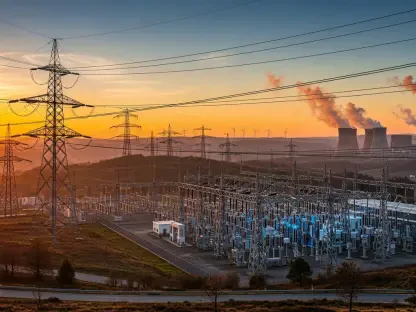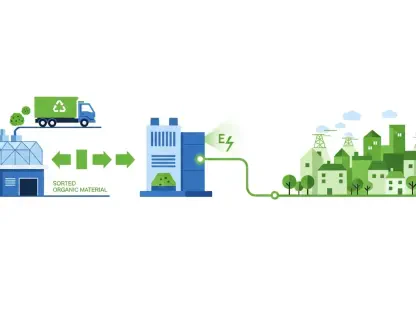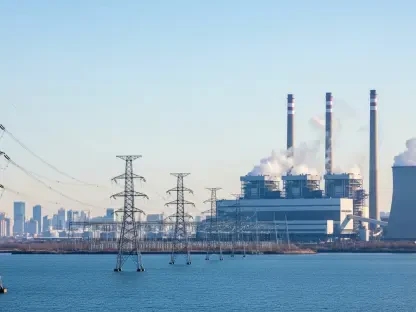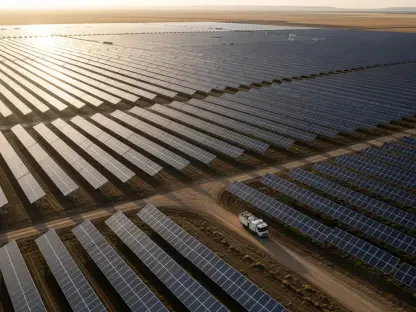In a groundbreaking stride for renewable energy infrastructure, two prominent players in the sector, OCI Energy and Nexus Renewable Power, have achieved a significant milestone by securing substantial financing for innovative projects in Texas. This development marks a pivotal moment for the state, which has long grappled with balancing its vast renewable energy potential against the challenges of grid reliability, especially during extreme weather events. The focus of this achievement lies in the advancement of Battery Energy Storage Systems (BESS), a technology poised to transform how energy from renewable sources like solar and wind is managed and distributed. By stabilizing the intermittent nature of these resources, BESS ensures a consistent power supply, addressing one of the most pressing hurdles in the shift toward sustainable energy. This funding success not only highlights growing investor confidence in clean energy solutions but also sets a promising precedent for similar initiatives across the nation, reinforcing the critical role of storage technology in modernizing energy grids.
Driving Renewable Energy Forward
The recent financial backing secured by these companies underscores a broader movement within the energy sector to prioritize storage solutions as a cornerstone of renewable integration. Battery Energy Storage Systems are designed to capture excess energy during periods of high production, such as sunny or windy days, and release it during peak demand or low generation times. This capability is particularly vital in a state like Texas, where renewable energy sources contribute a significant portion of the power mix but often face challenges due to their variable output. The newly funded projects aim to enhance grid stability by providing a buffer that smooths out fluctuations, ensuring that homes and businesses have access to reliable electricity regardless of weather conditions. Moreover, this investment signals a shift in how energy infrastructure is perceived, moving from traditional fossil fuel reliance to a future where clean, stored energy plays a dominant role in meeting societal needs.
Beyond the technical advantages, the economic implications of these BESS projects are substantial and far-reaching for Texas. The influx of capital into this sector is expected to stimulate local economies through job creation in construction, engineering, and maintenance of the storage facilities. Additionally, these initiatives position Texas as a leader in renewable energy adoption, potentially attracting further investments from both domestic and international stakeholders. The state’s unique combination of abundant renewable resources and a history of grid challenges makes it an ideal testing ground for cutting-edge technologies like BESS. By addressing intermittency issues, the projects help reduce the risk of blackouts during extreme weather, a concern that has plagued the region in recent years. This dual benefit of economic growth and enhanced energy security illustrates why financial support for such endeavors is not just a short-term win but a long-term strategy for sustainable development.
Addressing Grid Challenges
One of the most compelling aspects of the newly funded BESS projects is their potential to tackle longstanding grid reliability issues in Texas, a state that has faced significant scrutiny over its power infrastructure. The ability of battery storage to act as a rapid-response mechanism during sudden spikes in demand or unexpected outages cannot be overstated. These systems can discharge stored energy almost instantaneously, providing a critical safety net when the grid is under stress. This is especially relevant in a region prone to severe weather events, where the demand for electricity can surge dramatically during heatwaves or plummet during storms. The projects aim to create a more resilient energy network by reducing dependence on less flexible, traditional power sources, thereby mitigating the risk of widespread disruptions that have historically affected millions of residents and businesses.
Furthermore, the environmental benefits of expanding BESS capacity align closely with broader goals of reducing carbon emissions and combating climate change. By enabling greater integration of renewable energy into the grid, these storage systems help decrease reliance on fossil fuel-based backup generators, which are often deployed during peak demand periods. This shift not only lowers greenhouse gas emissions but also supports compliance with increasingly stringent environmental regulations. The Texas projects serve as a model for how technology and policy can intersect to drive meaningful progress in sustainability. As more regions look to replicate this approach, the lessons learned from these initiatives will likely inform future strategies for balancing energy needs with ecological responsibility. The successful financing of these efforts reflects a growing consensus that investing in clean energy infrastructure is both a practical necessity and a moral imperative for future generations.
Building a Sustainable Legacy
Reflecting on the journey that led to this financing milestone, the commitment of OCI Energy and Nexus Renewable Power to advancing BESS technology in Texas stands as a testament to the power of strategic collaboration and innovation. Their efforts culminated in a landmark achievement that addressed immediate grid challenges while laying the groundwork for a cleaner, more reliable energy landscape. The impact of their work resonates across the state, proving that targeted investments in storage solutions can yield transformative results for both infrastructure and the environment.
Looking ahead, the next steps involve scaling these projects to maximize their reach and influence, with an eye toward inspiring similar developments nationwide. Stakeholders must continue to prioritize funding and policy support for BESS, ensuring that technological advancements keep pace with growing energy demands. Exploring partnerships with local communities and educational institutions could further enhance public understanding and acceptance of these systems. This milestone serves as a call to action for other regions to invest in sustainable energy solutions, paving the way for a future where grid reliability and environmental stewardship go hand in hand.









